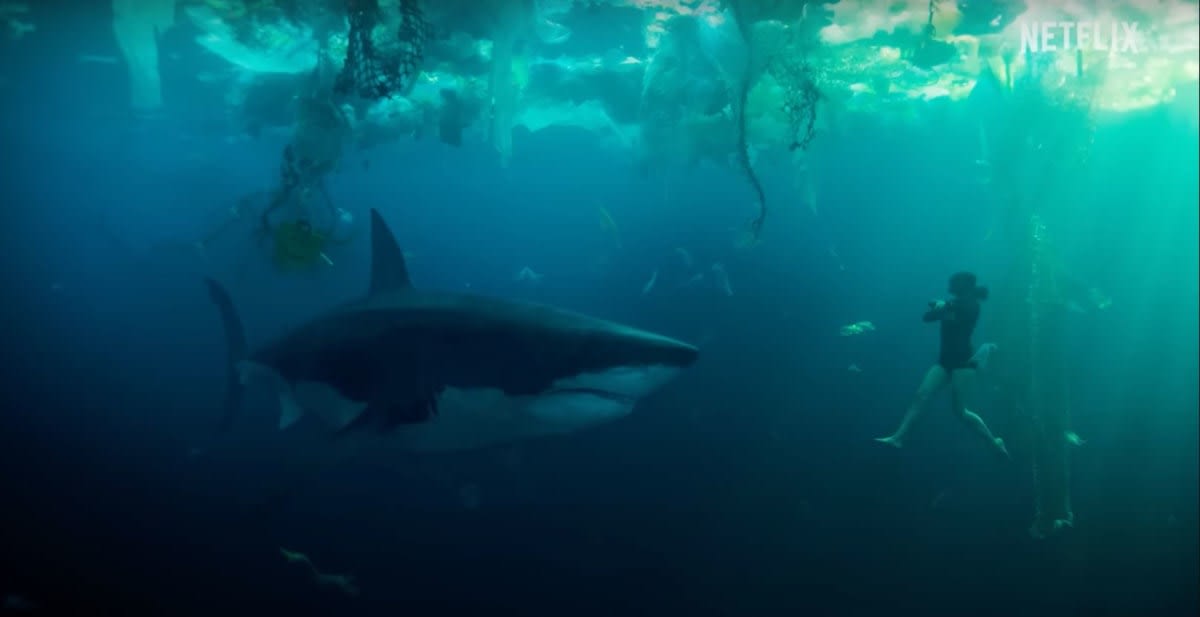Amidst the blood and gore, Netflix hit 'Under Paris' has a message: 80 million sharks are killed every year

LOS ANGELES, CALIFORNIA: The bloodthirsty shark Lilith attacks the murky depths of the Seine River in Netflix's latest film, 'Under Paris'.
Xavier Gens' film chronicles the incredible voyage of Lilith, a symbol of our planet's environmental concerns, as she navigates the dark waters of the Seine.
The movie shows scientist Sophia (Bérénice Bejo) bewildered and concerned about Lilith's existence in the Seine River. How did she arrive here? What does her presence signify? These questions are central to the story as the film explores Lilith's larger environmental challenges.
Beyond the cinematic lens of 'Under Paris', there is an urgent need to take steps to protect our oceans in real life too, and here are five astounding figures that highlight the critical need for conservation initiatives.
'Under Paris' shines light on the threats sharks are facing

The film 'Under Paris' highlights the critical need for action to save shark populations and maintain the ocean's biodiversity.
According to Pew, it is believed that each year, commercial fisheries kill 100 million sharks. Due to the ongoing demand for shark products and the high value of huge shark fins, a significant portion of the global shark fin trade is composed of silky and thresher sharks.
Additionally, the countries that are signatories to the Convention on International Trade in Endangered Species of Wild Fauna and Flora (CITES) will soon cast their votes on whether to include nine species of mobula rays, three species of thresher sharks, and silky sharks in CITES Appendix II.
Governments would have to demonstrate that ongoing international trade does not harm these shark and ray species, which would restrict trading in these animals.
Overfishing is contributing to the decline of shark populations

The numbers of some shark species have drastically decreased. As per Shark Trust, overfishing poses a serious threat to oceanic shark and ray species that venture into the high seas.
More than three-quarters of the species in this group are considered threatened, and population numbers have decreased by 71 percent over the last 50 years.
Combating overfishing can be aided by the pressing need to work at the national and international levels to stop overfishing by implementing science-based fisheries management.
Sharks are slaughtered for their fins

The shark fin trade is a rich industry, that is usually used for shark fin soup, a delicacy in various Asian nations.
Shark finning, a cruel process where sharks are caught, their fins cut off, and their bodies dumped at sea, has been made worse by the demand for this dish.
According to a Shark Stewards assessment, the fin trade is responsible for 80% of the anticipated 86 million shark deaths worldwide that result from shark fishing by the year 2023.
This is almost in line with the initial estimate from 2006, which put the number of shark deaths annually for fins at 73 million. 316 shark species have been classified as vulnerable, endangered, or critically endangered by the International Union for Conservation of Nature.
According to a 2021 assessment by Dulvey et al, more than 37% of sharks, rays, and skates face extinction. These include oceanic whitetip sharks, whale sharks, hammerhead sharks, and manta rays.
Coral Reef ecosystems are declining

Shark deaths are causing the overall health of coral reef ecosystems to decline, which is concerning because sharks are vital to maintaining the health of these ecosystems.
According to National Geographic, after carefully examining 371 reefs located throughout 58 countries, from the Central Pacific to the Bahamas, scientists discovered that about 20% of coral reefs were shark-free.
Sharks are essential apex predators that keep fish populations healthy by consuming unhealthy individuals and slowing the population increase of their prey.
Some reefs with the lowest shark populations were located close to populated areas; these included reefs in Qatar, the Dominican Republic, Colombia, Sri Lanka, and Guam.
Shark species are dangerously at risk

The population of sharks is rapidly declining as a result of the increased slaughter of sharks. According to the International Union for the Conservation of Nature (IUCN), 1,199 species in the Class Chondrichthyes—sharks, rays, and chimaeras—have undergone their first worldwide reevaluation.
Things have gotten worse in less than ten years, with 25% to 37% of sharks, rays, and chimaeras being classified as threatened or at high risk of extinction.
How to stream 'Under Paris'?

To watch the thrilling show on Netflix, you must have an exclusive subscription, as the streaming site offers several packages based on your budget.
The Standard Plan with advertising has a monthly membership fee of $6.99 and includes full HD (1080p) streaming.
The Standard Plan, which does not include advertisements, costs $15.49 per month and allows you to use one account on two screens simultaneously while streaming in 1080p/full HD resolution.
Viewers can watch 4K Ultra HD video on up to four screens simultaneously with the $22.99/month Premium Plan.
'Under Paris' trailer










